Marketing Management: Analyzing AI Benefits, Issues and Stakeholders
VerifiedAdded on 2023/04/20
|6
|1169
|360
Report
AI Summary
This report analyzes the impact of Artificial Intelligence (AI) on marketing, focusing on enhancing customer experience and addressing key marketing issues. It discusses how AI can leverage 'big data' to improve marketing campaigns, personalize customer interactions, and target the right audience with the right content. The report identifies customers, companies, and employees as key stakeholders, examining the benefits and potential drawbacks of AI implementation for each group. Strategies for addressing these issues include effectively utilizing 'big data', personalizing customer experiences, and targeting customer profiles. The conclusion emphasizes AI's potential to improve customer engagement, sales, and profitability.
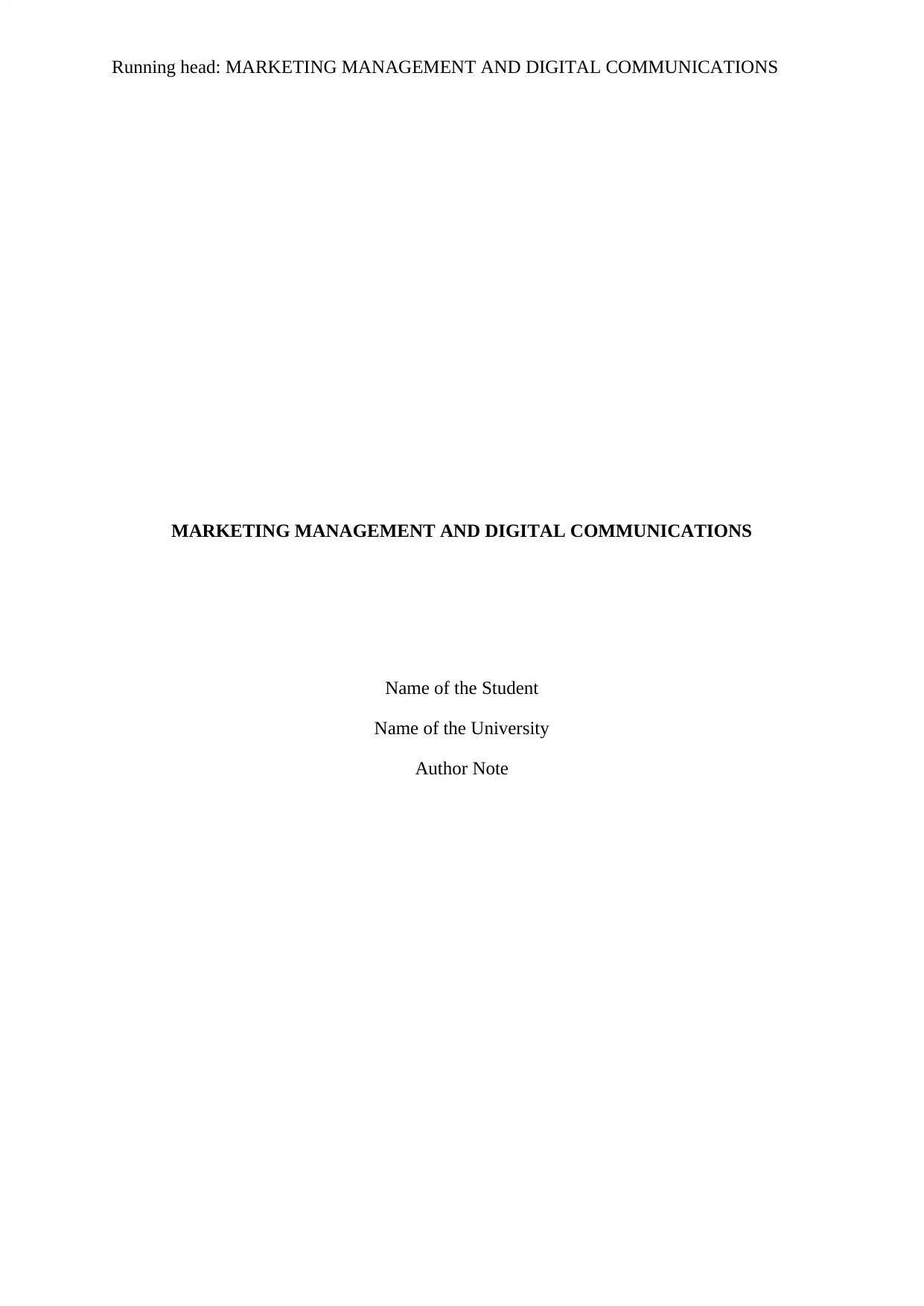
Running head: MARKETING MANAGEMENT AND DIGITAL COMMUNICATIONS
MARKETING MANAGEMENT AND DIGITAL COMMUNICATIONS
Name of the Student
Name of the University
Author Note
MARKETING MANAGEMENT AND DIGITAL COMMUNICATIONS
Name of the Student
Name of the University
Author Note
Paraphrase This Document
Need a fresh take? Get an instant paraphrase of this document with our AI Paraphraser
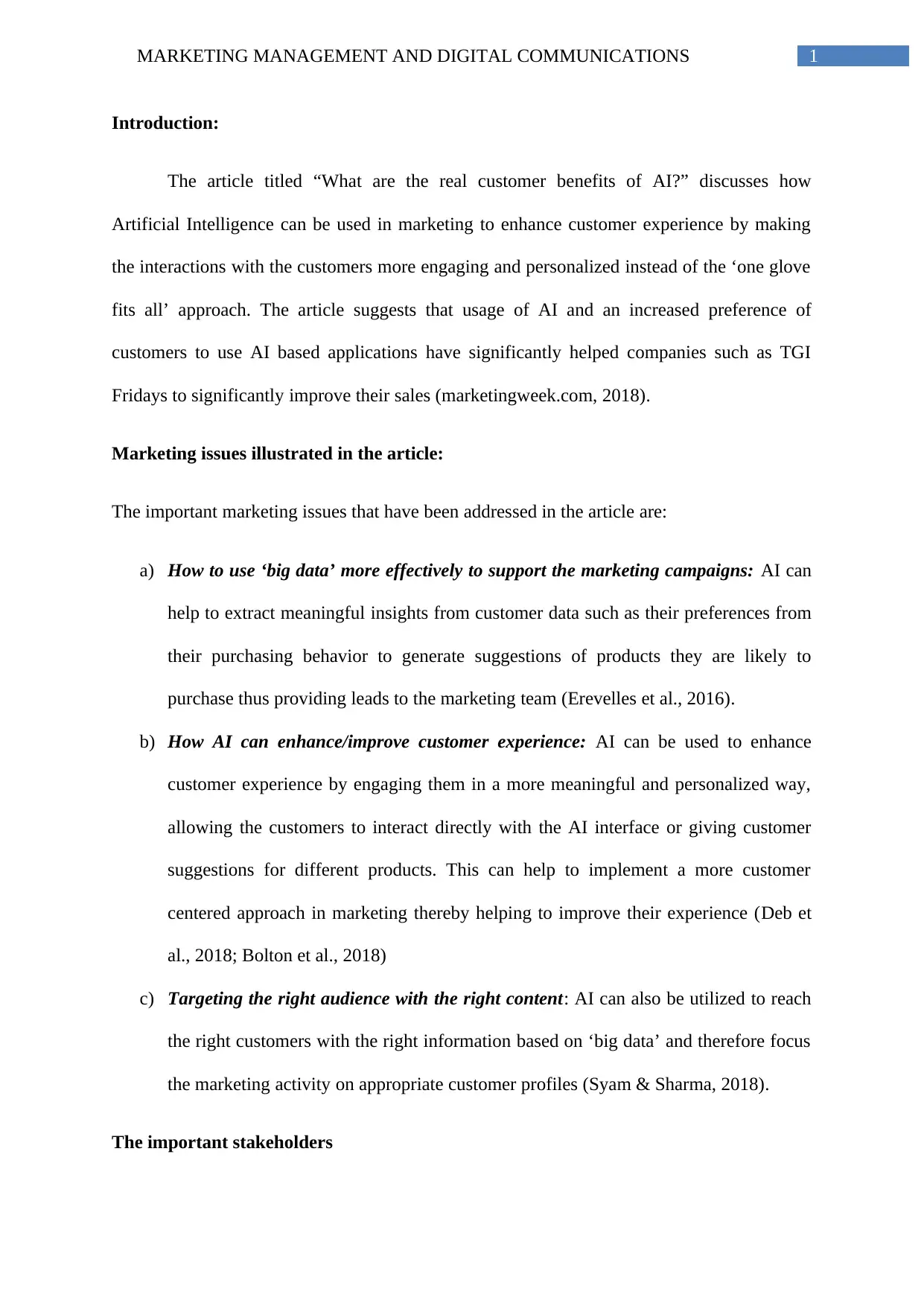
1MARKETING MANAGEMENT AND DIGITAL COMMUNICATIONS
Introduction:
The article titled “What are the real customer benefits of AI?” discusses how
Artificial Intelligence can be used in marketing to enhance customer experience by making
the interactions with the customers more engaging and personalized instead of the ‘one glove
fits all’ approach. The article suggests that usage of AI and an increased preference of
customers to use AI based applications have significantly helped companies such as TGI
Fridays to significantly improve their sales (marketingweek.com, 2018).
Marketing issues illustrated in the article:
The important marketing issues that have been addressed in the article are:
a) How to use ‘big data’ more effectively to support the marketing campaigns: AI can
help to extract meaningful insights from customer data such as their preferences from
their purchasing behavior to generate suggestions of products they are likely to
purchase thus providing leads to the marketing team (Erevelles et al., 2016).
b) How AI can enhance/improve customer experience: AI can be used to enhance
customer experience by engaging them in a more meaningful and personalized way,
allowing the customers to interact directly with the AI interface or giving customer
suggestions for different products. This can help to implement a more customer
centered approach in marketing thereby helping to improve their experience (Deb et
al., 2018; Bolton et al., 2018)
c) Targeting the right audience with the right content: AI can also be utilized to reach
the right customers with the right information based on ‘big data’ and therefore focus
the marketing activity on appropriate customer profiles (Syam & Sharma, 2018).
The important stakeholders
Introduction:
The article titled “What are the real customer benefits of AI?” discusses how
Artificial Intelligence can be used in marketing to enhance customer experience by making
the interactions with the customers more engaging and personalized instead of the ‘one glove
fits all’ approach. The article suggests that usage of AI and an increased preference of
customers to use AI based applications have significantly helped companies such as TGI
Fridays to significantly improve their sales (marketingweek.com, 2018).
Marketing issues illustrated in the article:
The important marketing issues that have been addressed in the article are:
a) How to use ‘big data’ more effectively to support the marketing campaigns: AI can
help to extract meaningful insights from customer data such as their preferences from
their purchasing behavior to generate suggestions of products they are likely to
purchase thus providing leads to the marketing team (Erevelles et al., 2016).
b) How AI can enhance/improve customer experience: AI can be used to enhance
customer experience by engaging them in a more meaningful and personalized way,
allowing the customers to interact directly with the AI interface or giving customer
suggestions for different products. This can help to implement a more customer
centered approach in marketing thereby helping to improve their experience (Deb et
al., 2018; Bolton et al., 2018)
c) Targeting the right audience with the right content: AI can also be utilized to reach
the right customers with the right information based on ‘big data’ and therefore focus
the marketing activity on appropriate customer profiles (Syam & Sharma, 2018).
The important stakeholders
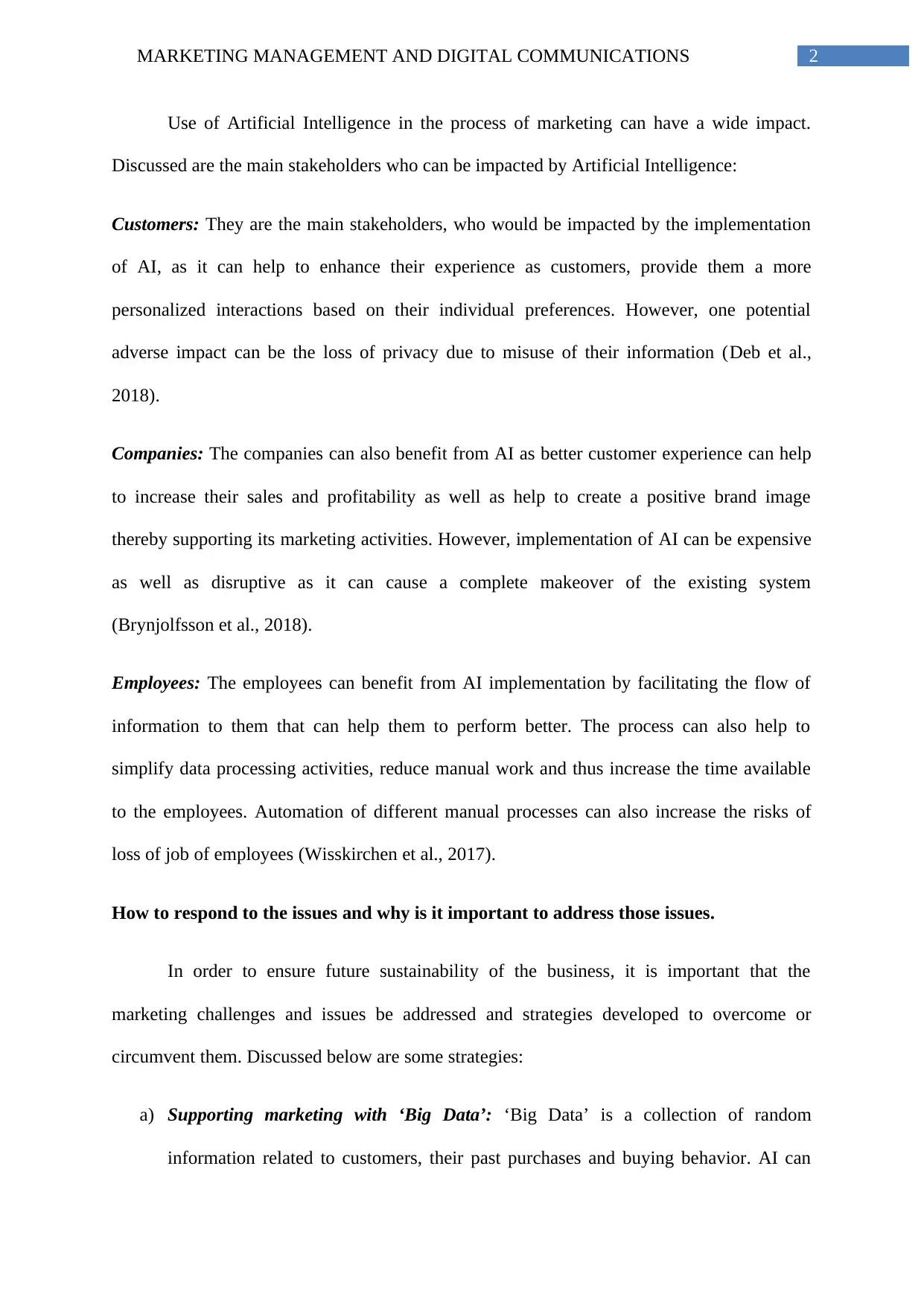
2MARKETING MANAGEMENT AND DIGITAL COMMUNICATIONS
Use of Artificial Intelligence in the process of marketing can have a wide impact.
Discussed are the main stakeholders who can be impacted by Artificial Intelligence:
Customers: They are the main stakeholders, who would be impacted by the implementation
of AI, as it can help to enhance their experience as customers, provide them a more
personalized interactions based on their individual preferences. However, one potential
adverse impact can be the loss of privacy due to misuse of their information (Deb et al.,
2018).
Companies: The companies can also benefit from AI as better customer experience can help
to increase their sales and profitability as well as help to create a positive brand image
thereby supporting its marketing activities. However, implementation of AI can be expensive
as well as disruptive as it can cause a complete makeover of the existing system
(Brynjolfsson et al., 2018).
Employees: The employees can benefit from AI implementation by facilitating the flow of
information to them that can help them to perform better. The process can also help to
simplify data processing activities, reduce manual work and thus increase the time available
to the employees. Automation of different manual processes can also increase the risks of
loss of job of employees (Wisskirchen et al., 2017).
How to respond to the issues and why is it important to address those issues.
In order to ensure future sustainability of the business, it is important that the
marketing challenges and issues be addressed and strategies developed to overcome or
circumvent them. Discussed below are some strategies:
a) Supporting marketing with ‘Big Data’: ‘Big Data’ is a collection of random
information related to customers, their past purchases and buying behavior. AI can
Use of Artificial Intelligence in the process of marketing can have a wide impact.
Discussed are the main stakeholders who can be impacted by Artificial Intelligence:
Customers: They are the main stakeholders, who would be impacted by the implementation
of AI, as it can help to enhance their experience as customers, provide them a more
personalized interactions based on their individual preferences. However, one potential
adverse impact can be the loss of privacy due to misuse of their information (Deb et al.,
2018).
Companies: The companies can also benefit from AI as better customer experience can help
to increase their sales and profitability as well as help to create a positive brand image
thereby supporting its marketing activities. However, implementation of AI can be expensive
as well as disruptive as it can cause a complete makeover of the existing system
(Brynjolfsson et al., 2018).
Employees: The employees can benefit from AI implementation by facilitating the flow of
information to them that can help them to perform better. The process can also help to
simplify data processing activities, reduce manual work and thus increase the time available
to the employees. Automation of different manual processes can also increase the risks of
loss of job of employees (Wisskirchen et al., 2017).
How to respond to the issues and why is it important to address those issues.
In order to ensure future sustainability of the business, it is important that the
marketing challenges and issues be addressed and strategies developed to overcome or
circumvent them. Discussed below are some strategies:
a) Supporting marketing with ‘Big Data’: ‘Big Data’ is a collection of random
information related to customers, their past purchases and buying behavior. AI can
⊘ This is a preview!⊘
Do you want full access?
Subscribe today to unlock all pages.

Trusted by 1+ million students worldwide
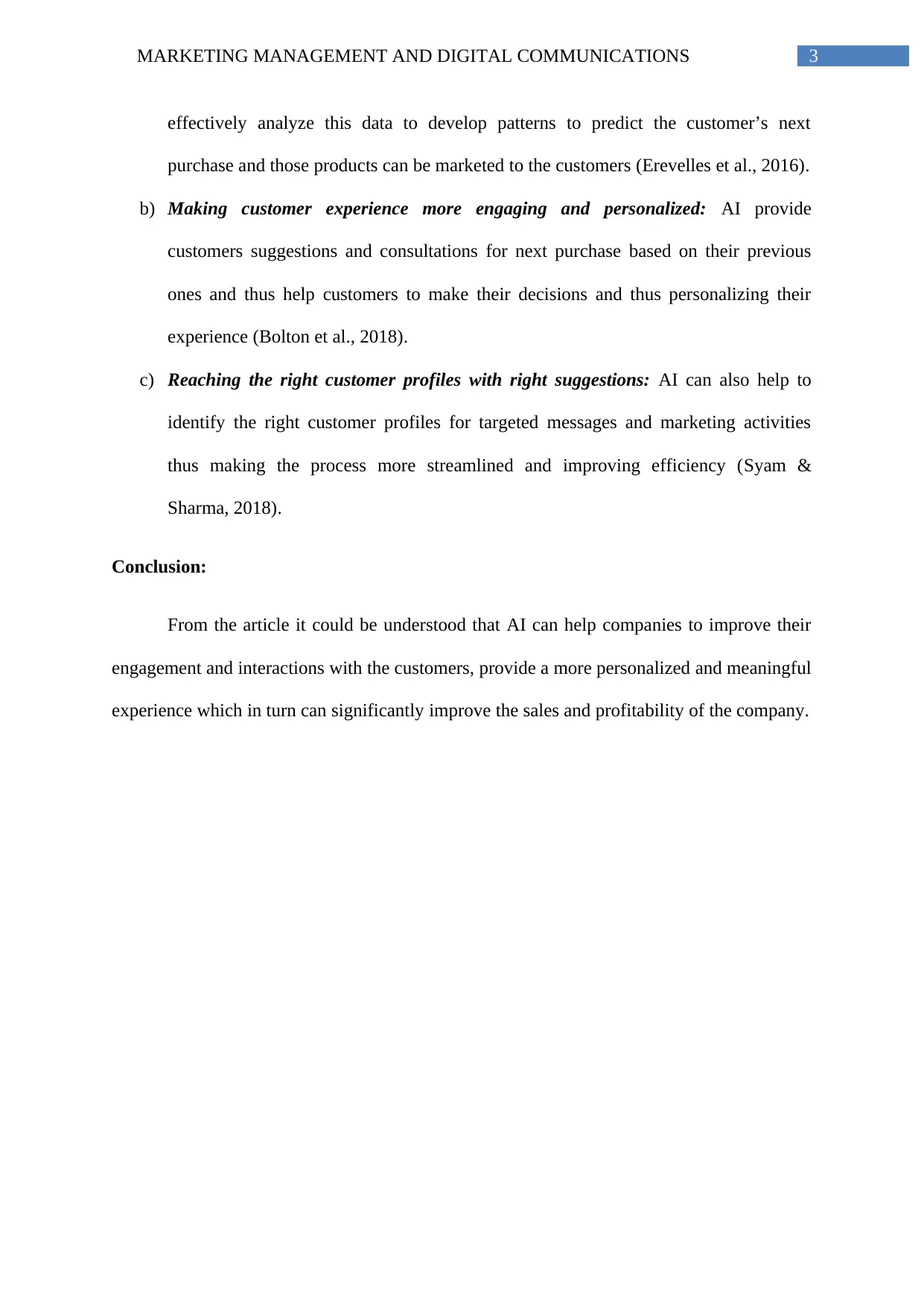
3MARKETING MANAGEMENT AND DIGITAL COMMUNICATIONS
effectively analyze this data to develop patterns to predict the customer’s next
purchase and those products can be marketed to the customers (Erevelles et al., 2016).
b) Making customer experience more engaging and personalized: AI provide
customers suggestions and consultations for next purchase based on their previous
ones and thus help customers to make their decisions and thus personalizing their
experience (Bolton et al., 2018).
c) Reaching the right customer profiles with right suggestions: AI can also help to
identify the right customer profiles for targeted messages and marketing activities
thus making the process more streamlined and improving efficiency (Syam &
Sharma, 2018).
Conclusion:
From the article it could be understood that AI can help companies to improve their
engagement and interactions with the customers, provide a more personalized and meaningful
experience which in turn can significantly improve the sales and profitability of the company.
effectively analyze this data to develop patterns to predict the customer’s next
purchase and those products can be marketed to the customers (Erevelles et al., 2016).
b) Making customer experience more engaging and personalized: AI provide
customers suggestions and consultations for next purchase based on their previous
ones and thus help customers to make their decisions and thus personalizing their
experience (Bolton et al., 2018).
c) Reaching the right customer profiles with right suggestions: AI can also help to
identify the right customer profiles for targeted messages and marketing activities
thus making the process more streamlined and improving efficiency (Syam &
Sharma, 2018).
Conclusion:
From the article it could be understood that AI can help companies to improve their
engagement and interactions with the customers, provide a more personalized and meaningful
experience which in turn can significantly improve the sales and profitability of the company.
Paraphrase This Document
Need a fresh take? Get an instant paraphrase of this document with our AI Paraphraser
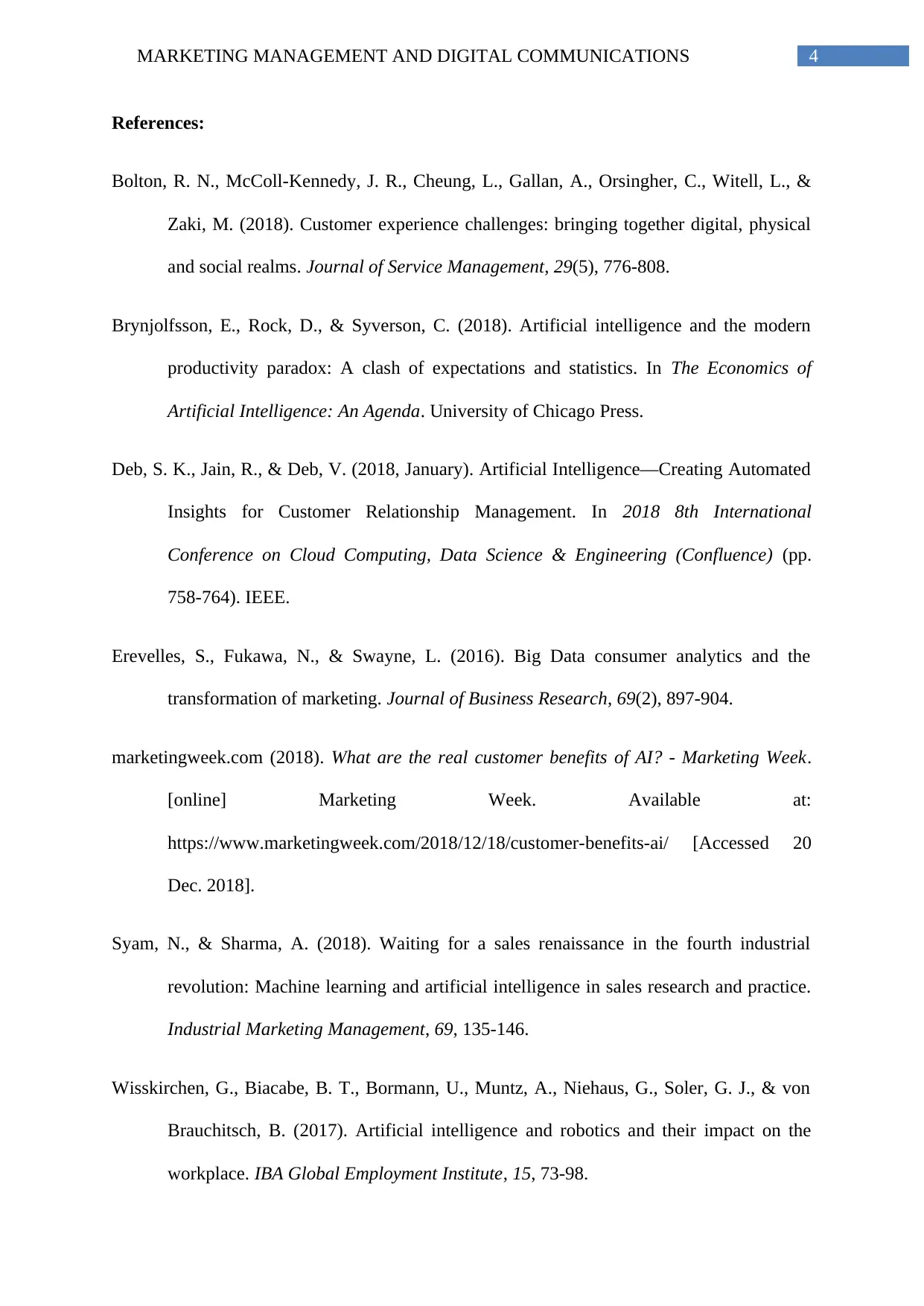
4MARKETING MANAGEMENT AND DIGITAL COMMUNICATIONS
References:
Bolton, R. N., McColl-Kennedy, J. R., Cheung, L., Gallan, A., Orsingher, C., Witell, L., &
Zaki, M. (2018). Customer experience challenges: bringing together digital, physical
and social realms. Journal of Service Management, 29(5), 776-808.
Brynjolfsson, E., Rock, D., & Syverson, C. (2018). Artificial intelligence and the modern
productivity paradox: A clash of expectations and statistics. In The Economics of
Artificial Intelligence: An Agenda. University of Chicago Press.
Deb, S. K., Jain, R., & Deb, V. (2018, January). Artificial Intelligence―Creating Automated
Insights for Customer Relationship Management. In 2018 8th International
Conference on Cloud Computing, Data Science & Engineering (Confluence) (pp.
758-764). IEEE.
Erevelles, S., Fukawa, N., & Swayne, L. (2016). Big Data consumer analytics and the
transformation of marketing. Journal of Business Research, 69(2), 897-904.
marketingweek.com (2018). What are the real customer benefits of AI? - Marketing Week.
[online] Marketing Week. Available at:
https://www.marketingweek.com/2018/12/18/customer-benefits-ai/ [Accessed 20
Dec. 2018].
Syam, N., & Sharma, A. (2018). Waiting for a sales renaissance in the fourth industrial
revolution: Machine learning and artificial intelligence in sales research and practice.
Industrial Marketing Management, 69, 135-146.
Wisskirchen, G., Biacabe, B. T., Bormann, U., Muntz, A., Niehaus, G., Soler, G. J., & von
Brauchitsch, B. (2017). Artificial intelligence and robotics and their impact on the
workplace. IBA Global Employment Institute, 15, 73-98.
References:
Bolton, R. N., McColl-Kennedy, J. R., Cheung, L., Gallan, A., Orsingher, C., Witell, L., &
Zaki, M. (2018). Customer experience challenges: bringing together digital, physical
and social realms. Journal of Service Management, 29(5), 776-808.
Brynjolfsson, E., Rock, D., & Syverson, C. (2018). Artificial intelligence and the modern
productivity paradox: A clash of expectations and statistics. In The Economics of
Artificial Intelligence: An Agenda. University of Chicago Press.
Deb, S. K., Jain, R., & Deb, V. (2018, January). Artificial Intelligence―Creating Automated
Insights for Customer Relationship Management. In 2018 8th International
Conference on Cloud Computing, Data Science & Engineering (Confluence) (pp.
758-764). IEEE.
Erevelles, S., Fukawa, N., & Swayne, L. (2016). Big Data consumer analytics and the
transformation of marketing. Journal of Business Research, 69(2), 897-904.
marketingweek.com (2018). What are the real customer benefits of AI? - Marketing Week.
[online] Marketing Week. Available at:
https://www.marketingweek.com/2018/12/18/customer-benefits-ai/ [Accessed 20
Dec. 2018].
Syam, N., & Sharma, A. (2018). Waiting for a sales renaissance in the fourth industrial
revolution: Machine learning and artificial intelligence in sales research and practice.
Industrial Marketing Management, 69, 135-146.
Wisskirchen, G., Biacabe, B. T., Bormann, U., Muntz, A., Niehaus, G., Soler, G. J., & von
Brauchitsch, B. (2017). Artificial intelligence and robotics and their impact on the
workplace. IBA Global Employment Institute, 15, 73-98.

5MARKETING MANAGEMENT AND DIGITAL COMMUNICATIONS
⊘ This is a preview!⊘
Do you want full access?
Subscribe today to unlock all pages.

Trusted by 1+ million students worldwide
1 out of 6
Related Documents
Your All-in-One AI-Powered Toolkit for Academic Success.
+13062052269
info@desklib.com
Available 24*7 on WhatsApp / Email
![[object Object]](/_next/static/media/star-bottom.7253800d.svg)
Unlock your academic potential
Copyright © 2020–2026 A2Z Services. All Rights Reserved. Developed and managed by ZUCOL.





